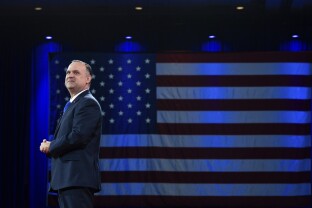Dan Scavino has proudly served as President Donald Trump’s social media guru for nearly a decade, now occupying the role of deputy chief of staff. But in court, he’s arguing his relationship with the president could be disastrous to his reputation.
That legal argument popped up in one of the few major court cases against Trump that have continued since he assumed the presidency and still threaten his bank account — one in which cops and legislators are trying to hold him personally accountable for the damage his followers caused when they stormed the Capitol on Jan. 6, 2021.
Trump is currently trying to use the shield of presidential immunity to snuff out these eight consolidated lawsuits. Opposing lawyers countered in February with a 55-page court filing that was supported by 186 exhibits.
Three of those apparently involve Scavino, who’s now trying to keep them from going public.
On March 7, Scavino’s lawyer asked the judge to keep them under seal — and even “require the redaction of any reference to the contents” within them going forward. But it’s his argument for doing so that could raise eyebrows.
“The current political climate and the observable news cycles over the last nine years have demonstrated that revealing inoffensive details about one’s involvement with President Trump’s administration, particularly in the matters discussed in the sealed exhibits, would likely to lead to public degradation,” attorney Mark P. Nobile wrote.
In a court response on Friday, plaintiff lawyer Edward G. Caspar pointed out the obvious irony.
“His argument borders on frivolous. Were it so, then surely [Scavino] would not have agreed to serve as an official senior advisor to President Trump in his second term,” Caspar wrote.
Scavino’s attorney did not respond to a request for comment Tuesday.
Whatever is in those exhibits isn’t likely to be particularly revelatory, given the extensive investigation made public by the House Jan. 6 Committee, which already released its 845-page final report and hundreds of pages of supporting documents. Lawyers for injured police officers and congressional Democrats say as much, noting that the public records “contain substantially the same information as the exhibits.”
However, at least some of the material appears to be the same evidence Scavino turned over to the Department of Justice during the federal grand jury that investigated the Jan. 6 insurrection, according to a disclosure made in a related New York case in which Capitol Police officers tried to force Scavino into responding to a subpoena. (Scavino received that subpoena in August, and court filings claim he only began to turn over records last month.)
In court, Scavino also claims that the evidence includes “confidential executive branch information” from his time at the White House, which would be covered by a judicial protective order in the case.
But the bulk of his argument for keeping it secret rests on the idea that whatever is in those exhibits would be embarrassing, with his lawyer relying on legal precedent stemming from a 1980 case that frowned upon the way a lower court judge released records in a case involving the government seizure of some 50,000 documents from the Church of Scientology in Los Angeles.
Scavino’s attorney also pointed to a 1981 decision that concerned the way journalists were denied access to courtroom evidence gathered by the FBI in its famous “ABSCAM” investigation into congressional corruption.
“Courts have noted that exposure to potential ‘public humiliation and degradation’ can satisfy this factor,” Scavino’s lawyer wrote.
—
Jose Pagliery is a reporter at NOTUS.
Sign in
Log into your free account with your email. Don’t have one?
Check your email for a one-time code.
We sent a 4-digit code to . Enter the pin to confirm your account.
New code will be available in 1:00
Let’s try this again.
We encountered an error with the passcode sent to . Please reenter your email.


